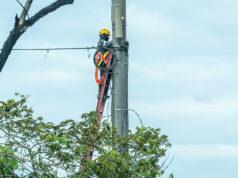PHL startups outperform big firms in AI adoption

PHILIPPINE startups are adopting artificial intelligence (AI) technologies faster than bigger enterprises, but overall adoption remains at a basic level, according to a report by Amazon Web Services (AWS) and advisory firm Strand Partners.
The study found that 64% of Philippine businesses using AI reported an average revenue increase of 18%, while 66% expect to achieve average cost savings of 22%.
“Businesses in the Philippines are keen to innovate with AI, and the high level of adoption underscores a tremendous potential for the Philippine economy,” AWS Philippines Country Manager Precious Lim said in a statement. “However, the research shows how serious barriers remain, especially for larger enterprises, to deepen their use of AI.”
Startups were found to be more enthusiastic and innovative in their adoption of AI. About 45% of startups said they were using AI in some form, with 40% building entirely new AI-driven products.
By comparison, 41% of large enterprises reported using AI, but only 7% have reached the most advanced stage of adoption. One in three startups have reached this transformative level, where AI is integrated into core product development, business models and decision-making.
Strand Partners Director Nick Bonstow warned that this “two-tier” AI economy could have lasting effects on the country’s economic development.
The report showed that 78% of Philippine businesses are still focused on basic AI use cases such as improving efficiency and streamlining processes. Only 11% had reached an intermediate level of adoption, while 8% advanced to transformative use.
Lack of skilled talent remains the biggest barrier to scaling AI. AWS and Strand Partners said AI literacy is needed for 61% of jobs in the next three years, yet only 26% of businesses believe their workforce is adequately prepared.
Funding is another hurdle, with 48% of businesses citing access to capital as critical for growth. Startups in particular said access to venture capital is essential to building a stronger AI ecosystem.
The survey also found concerns about regulation. About 42% of businesses worry that AI rules could slow down innovation and adoption, while 40% fear rising compliance costs.
Philippine companies estimate that $19 of every $100 spent on technology already goes to compliance, and 72% expect this share to rise in the next three years.
Overcoming these barriers requires greater investment in digital skills, streamlined pro-growth regulation and stronger government adoption of AI in public services such as healthcare, education, and procurement, according to the study.
“To maintain the Philippines’ competitive edge in the global AI stage, it is essential that the government and private sector take the right steps in addressing the challenges businesses face,” Ms. Lim said.
The report surveyed 1,000 Philippine business leaders and 1,000 “nationally representative members” of the public. — Beatriz Marie D. Cruz



